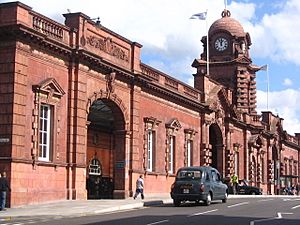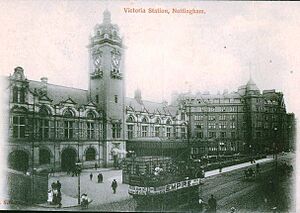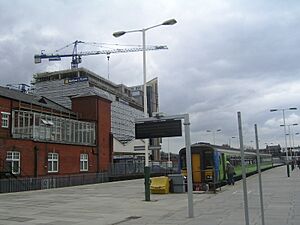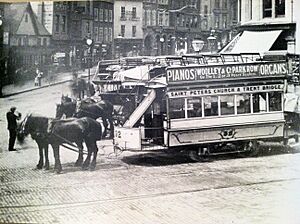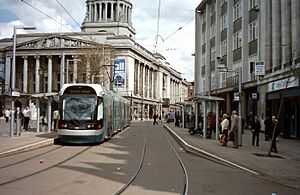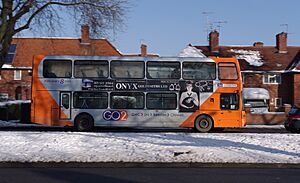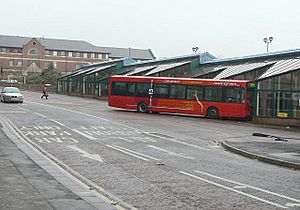Transport in Nottingham facts for kids
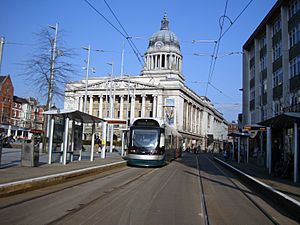
Nottingham is a big city in the United Kingdom. For a long time, its transport system wasn't great. But in the 2000s, the UK government put a lot of money into improving it. This helped bring back the Robin Hood Line trains and build a new tram system called Nottingham Express Transit.
Contents
Trains in Nottingham
A Look Back at Nottingham's Trains
The very first train station in Nottingham opened in 1839. It was built on Carrington Street by the Midland Counties Railway. Trains from this station went to Derby.
By 1848, the station was too small. A new, bigger station was built by the Midland Railway. This new station allowed trains to travel through Nottingham to places like Lincoln.
In 1900, a new station called Nottingham Victoria station opened. It was part of a new train line to London. Trains from here went to Marylebone station in London.
In 1904, the Midland Railway closed their old station. They opened a new one, which is the Nottingham Midland station we use today.
Sadly, by 1967, Nottingham Victoria station was old and not many people used it. So, it closed down, along with its main train line. Another station, Nottingham Arkwright Street, also closed in 1969.
The Robin Hood Line, which runs from Nottingham to Worksop, had also closed to passengers in the 1960s. But it was reopened in stages between 1993 and 1998, which was great news!
Today's Train Services
Today, Nottingham Midland station is a busy place. Three different train companies use it:
- East Midlands Railway runs fast trains to London St Pancras. These trains run twice every hour. They also have services to Norwich, Liverpool, Skegness, and other towns.
- CrossCountry provides hourly trains to Birmingham New Street and Cardiff.
- Northern runs hourly trains to Leeds, going through Sheffield.
Future Train Plans
There were plans for super-fast trains, called High Speed 2, to come to Nottingham. A new station, East Midlands Hub, was planned near Toton.
However, the plans for the line between Birmingham and Leeds have now been cancelled.
Trams in Nottingham
How Trams Started
Nottingham first had horse-drawn trams in 1878. Then, steam trams started running in 1880. In 1898, the city council took over the tram system.
Electric trams were introduced in 1901, and the last horse tram ran in 1902. Between 1926 and 1936, the tram network was replaced by trolleybuses and regular buses.
Nottingham Express Transit (NET)
Nottingham Express Transit (NET) is Nottingham's modern tram system. The first line opened on March 9, 2004. It cost £167 million to build! It took 16 years from the first idea to the trams actually running.
There are currently two tram lines:
- Line 1 runs between Hucknall and Toton Lane. Part of this line runs next to the Robin Hood Line train track.
- Line 2 runs from Phoenix Park to Clifton.
You can buy tickets easily at any tram stop.
Roads and Driving
Nottingham is well-connected to major roads. The M1 motorway is nearby, as are the A52 and A46 roads. The A52, going towards Derby, is even called Brian Clough Way!
To help with traffic, there are several park and ride locations. You can park your car there and then take a tram or bus into the city.
Workplace Parking Charge
In April 2012, Nottingham became the first city in the UK to introduce a "workplace parking levy." This means businesses have to pay for each parking space they provide for their employees. This applies to businesses with more than ten parking spaces.
The money collected, about £10 million a year, is used to improve Nottingham's transport. For example, it has helped fund the tram system. Since this charge started, car traffic has gone down by 9%, and public transport use has gone up by 15%.
Cycling in Nottingham
Nottingham has many cycle routes where you can ride your bike away from traffic. These include:
- Route 6 of the National Cycle Network goes past University of Nottingham and Queen's Medical Centre. It continues through Wollaton and Bulwell.
- Route 15 starts from Trent Bridge and goes to Sleaford. It passes by Holme Pierrepont National Watersports Centre.
- The Big Track is a circular route along the River Trent and the Beeston Canal and Nottingham Canal.
Volunteers from Sustrans help look after these national cycle routes. A new bridge for bikes and walkers is being built over the River Trent. This will connect cycle routes on both sides of the river.
Scooter Hire
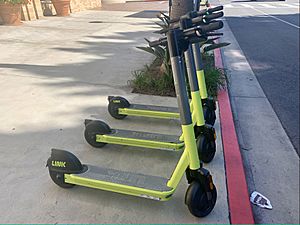
Nottingham was one of the first places in the UK to try out electric scooters for hire. This trial started in October 2020. Riders must be at least 18 years old and have a driving licence. They can only ride on roads and bus lanes, not on pavements.
The company that provided the scooters stopped operating in late 2023. Nottingham City Council is now looking for a new company to continue the scooter hire scheme.
Flying from Nottingham
East Midlands Airport is close to Nottingham. It has flights to many European cities like Paris, Milan, and Berlin. You can also fly to places like Edinburgh and Belfast within the UK. Some longer flights go to places like Barbados and Mexico.
Birmingham Airport is about an hour away. It offers flights to most major European cities, and even to New York, Boston, and Dubai.
Buses in Nottingham
Nottingham City Transport (NCT) runs most of the bus services in the city. They were the first in the UK to use special electronic passes for buses in 2000.
Trent Barton also runs many local services. These go to nearby towns like Beeston, Mansfield, and Derby.
Both NCT and Trent Barton have won awards for being the best bus operators. They work together so their routes don't compete. You can even buy a "Kangaroo" day ticket to use buses from both companies!
Nottingham has two main bus stations in the city centre: Broadmarsh and Victoria.
Broadmarsh Bus Station
Broadmarsh bus station is in the city centre, near the old Broadmarsh Shopping Centre. It's also close to the train and tram stations.
Most buses from here are run by Trent Barton. They go to places like Beeston, Radcliffe-on-Trent, and East Midlands Airport.
Victoria Bus Station
Victoria bus station is inside the Victoria Centre shopping mall.
Trent Barton manages the travel shop here. They run buses to Queen's Medical Centre, University Park, Derby, and Mansfield.
Stagecoach also has routes from here to Sherwood Forest and Chesterfield. Nottingham City Transport buses stop at nearby streets.
Tickets for Travel
All bus and tram companies sell single journey tickets and day tickets. These can be used on all services run by that company.
There's also a special "Robin Hood" day ticket. This ticket lets you travel on any bus, tram, or local train service within the Nottingham area. It's a great way to explore the city!
Taxis in Nottingham
Nottingham has many licensed taxi companies. You can also find dark green London-style taxis, called Hackney Carriages, which you can stop on the street.
There are special places called taxi ranks in the city centre. You can find them at Nottingham station, the Victoria Centre, and Broadmarsh bus station.
Nottingham City Council has officers who check that taxi drivers are following the rules. This helps make sure everyone has a safe journey.
 | Precious Adams |
 | Lauren Anderson |
 | Janet Collins |


